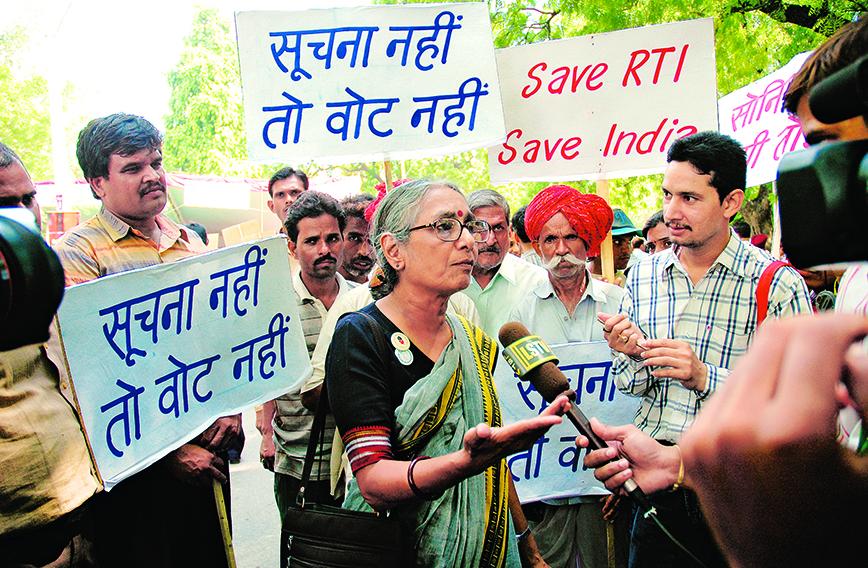
Aruna Roy talking to the media during a right to information protest in Delhi
The gritty fight for equality
Usha Rai
Aruna Roy, the IAS officer who gave up the civil service to live and understand life in rural India, is a celebrated feminist and activist. She believes in the power of social movements and collectives to transform the countryside and ensure the democratic rights of people, especially the poor and the marginalized. Some 34 years ago, she with Nikhil Dey and Shankar Singh moved into a small hut in Bhim, 110 km from Ajmer, and with peasants and workers of central Rajasthan started the Mazdoor Kisan Shakti Sangathan (MKSS) to appraise issues from the grassroots, and understand their struggles for their rights.
Her memoir, aptly titled based on the feminist slogan ‘The Personal is Political’, is a gripping commentary on her own journey as a privileged, educated person and people’s struggles with the caste system, hunger, poverty, inequality and the fight for rights enshrined in the Constitution. It was such collective struggles that resulted in the Right to Information (RTI) Act, the Mahatma Gandhi National Rural Employment Guarantee Act (MGNREGA) and a School for Democracy in Bhim.
The fact that she was a teacher of English literature in her early years comes through very clearly in the book which is beautifully written and peppered with humane stories of Naurti, Billan, Mangi, Hassena and several others who wanted to lessen their dependence on the literate upper class as well as ensure they were not cheated of wages due to them. Her love for arts and literature and her erudition comes through equally well whether she is talking of Mohanji, the bard of MKSS, or drawing on the philosophy of Rabindranath Tagore, Brecht, Eduardo Galeano, Ibsen, Victor Hugo, Huxley or Orwell.
She explains that singing and chanting slogans together empowers and connects individuals to form a collective, but the emotions between different voices are highly individual. The unified chants empower individual thought. From this nourishing dialectic between the person and the collective emerges the seminal feminist slogan — ‘The Personal is Political’.
The past two decades have been for her a gradual learning of how intimately connected personal lives are with political events, processes and the character of institutions. As an example of the encroachment on the right to religion and the right to marry a person of one’s choice, she refers to the Uttar Pradesh Prohibition of Unlawful Conversion Ordinance, 2020, which contests inter-community marriages. “Though there was debate on it and many women protested, the law still stands and is known as the love jihad law.”
In addition to all their woes, Dalit and underprivileged women are subjected to rape — not just as an assertion of lust but as an expression of power, often by upper caste men. It is punishment of the powerless by the powerful. Demand for justice or equality can trigger anger and revenge. The book recounts the story of the 11-year-old rape survivor who was brought by her father to a mahila mela, seeking justice. Hundreds of women were drawn into a discussion on sexual violence and a thousand women, with faces covered in keeping with local custom, participated in the rally in Kishangarh, carrying placards. They tied their black armbands on a thorny babul tree outside the court and handed their petition to the sub-divisional magistrate.
The memoir recalls the sati of Roop Kanwar in 1987 and the 1992 rape of Bhanwari Devi, a Women’s Development Programme Sathin, for trying to stop a child marriage in a Gujjar family. While the sati incident showed the upper caste promotion of patriarchy, the assertion in the Bhanwari rape case that no upper caste man would rape a lower caste, middle-aged woman generated ripples of anger and the birth of the Mahila Atyachar Virodhi Jan Andolan. Women began to politically assert their rights and demand legal redressal for sexual harassment in the workplace, leading to the Vishaka judgment of 1997. The voices raised were of poorer sections of women, not the elite. These campaigns, including, later, the Nirbhaya case, successfully demanded public consultation in the framing of policies on women’s safety and security.
Though men still dominate electoral politics, the reservation for women in panchayats saw the emergence of women sarpanches like Naurti, Rukmini and Kamla who made programmes work for the poor, especially MGNREGA. In fact, working class women’s politics was taught to Roy by these women.
Roy, being Roy, has also boldly expressed her concerns about the present government and the whittling away of the gains of hard-fought battles for the RTI and constitutional values. The book refers to the new low reached in the history of civil rights in India during the 2019-2020 protests against the CAA (Citizenship (Amendment) Act) when challenging the majoritarian state led to the clamping down on all freedoms. Those who dared to speak truth to power were quashed into silence by a campaign of incarceration, hatred and fear.
“The tragedy of contemporary India is the violation of the spirit of the Constitution.” She talks about the vigilantism and moral policing that heralds a fractured society.
The fight for a just democracy is on-going. Quoting Galeano, she reflects on how difficult it is to achieve utopia. “Courage lies in walking towards what may always recede.”
Comments
Currently there are no Comments. Be first to write a comment!



